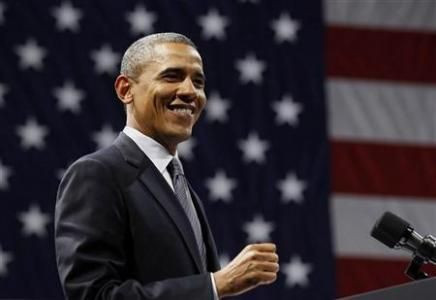Conservatives Deny Jobs Report Is Good News For Obama

In a development that’s sure to give the White House a much-needed post-debate boost, the Bureau of Labor Statistics, or BLS, reported on Friday that the national unemployment rate dropped to 7.8 percent in September -- its lowest level since January 2009.
The September jobs report is the next-to-last one before the presidential election -- and now the unemployment rate is lower than it was when President Barack Obama entered office. It’s a good omen for the campaign, considering that no incumbent president has won reelection with an unemployment rate above 8 percent since Franklin Delano Roosevelt in the 1930s.
On top of that, the BLS announced that about 418,000 more people entered the labor force than the month before, bringing the ratio of the American population with a job to its highest level since May 2010. Meanwhile, some 873,000 more Americans reported having jobs in a survey of households, and 456,000 fewer reported not having a job but wanting one.
But Republican candidate Mitt Romney, who hit Obama hard during the debate on his inability to reboot the nation’s economy -- the central focus of his campaign -- on Friday said the latest numbers are still high by historical standards.
“This is not what a real recovery looks like," Romney said. "We created fewer jobs in September than in August and fewer jobs in August than in July, and we’ve lost over 600,000 manufacturing jobs since President Obama took office. If not for all the people who have simply dropped out of the labor force, the real unemployment rate would be closer to 11 percent.”
Other conservatives insisted the newest numbers are simply too good to be true. Former General Electric CEO Jack Welch accused the administration of cooking the books, writing in a message on Twitter: “Unbelievable job numbers … these Chicago guys will do anything… can’t debate so change numbers.”
Although Rep. Eric Cantor did not accuse the administration of fudging the numbers, the House Majority Leader did say in a statement that the reported gains are not a cause for celebration.
“While today’s unemployment report offered some encouraging news, it simply isn’t good enough,” he said.
But the Obama campaign is pointing to the BLS report as evidence that the president’s policies have, slowly but surely, rebooted a previously anemic economy.
“While there is more work that remains to be done, today’s employment report provides further evidence that the U.S. economy is continuing to heal from the wounds inflicted by the worst downturn since the Great Depression,” Alan Krueger, chairman of Obama’s Council of Economic Advisers, wrote on the White House’s blog.
According to the Economic Policy Institute, the establishment survey (which shows job growth) is demonstrative of the steady but modest growth the nation has been seeing for the last two-and-half years. But the household survey (which provides the unemployment rate) was “extremely positive.”
“The rule of thumb when the two surveys tell different stories is to go with what the establishment survey says. However, the household survey provides reasons to be somewhat more optimistic about job opportunities for American workers,” EPI economist Heidi Shierholz wrote Friday.
© Copyright IBTimes 2025. All rights reserved.





















